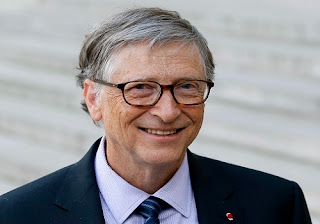Following reports Friday about his proposed visit with Chairman of Dangote Group, Aliko Dangote to President Bola Tinubu, Bill Gates, co-chair of the Bill & Melinda Gates Foundation, Saturday shed more light on the occasion.
The Foundation stated that Gates will visit not only Nigeria but also its northern neighbor Niger to meet with leaders and partners tackling health and development challenges.
It explained in a statement that the meeting follows Gates’ recent visit to China. It noted that the visit is part of the Gates Foundation’s commitment to work closely with communities and leaders to support innovation that can help accelerate progress and improve lives across Africa.
The Foundation said: “Gates and other foundation leaders are visiting to learn from partners helping to address polio, anemia, and other health threats; scientists applying research to develop agricultural innovations that will help with food security and climate adaptation; innovators using technology to improve access to financial services; and others working to improve lives in Niger and Nigeria and throughout the continent.
“They will also meet with national and regional leaders to encourage them to make investments and advance policies that promote innovation and provide equitable opportunity, despite challenging economic conditions.
“Gates will also participate in a conversation with students and young leaders to gather insights and share perspectives on how science and innovation can accelerate positive change and contribute to a brighter outlook for Africa.
“The moderated event, Advancing Africa: Unleashing the Power of Youth in Science and Innovation, will be co-hosted by the Co-Creation Hub Nigeria and Lagos Business School and livestreamed across Africa by media partners Africa.com and Channels Television. It will take place at 10am WAT (Lagos) on 21 June. You can register here to attend virtually.”
The Bill & Melinda Gates Foundation believes that solutions to Africa’s greatest challenges can come from within Africa, hence its support for African partners “whose bold ideas and creative approaches have the potential to save lives, improve health, and help families across the continent.”
Since the foundation’s inception in 2000, it has supported partnerships with African regional institutions, national governments, and local communities in 49 African countries to contribute funding and scientific expertise in support of their agendas for change. These partnerships have driven the success of numerous health, agriculture, equality, and anti-poverty initiatives.
In Niger, the foundation works with the government and multilateral organizations to strengthen routine immunization and control polio outbreaks.
In Nigeria, the foundation works with the government of Nigeria, the private sector, non-profit organizations and civil society to improve health outcomes, boost agricultural productivity, expand access to digital financial services, and empower women and other marginalized populations with greater economic opportunities.
CREDIT: THE NATION


